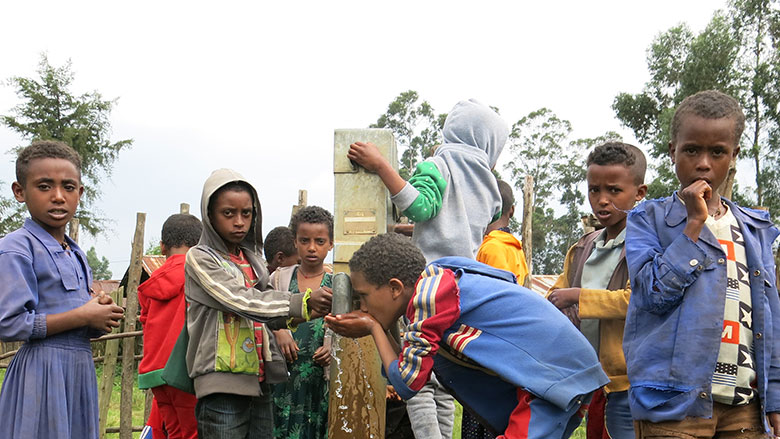ADDIS ABABA, November 14, 2019 – With a Human Capital Index (HCI) of 0.38, Ethiopia ranks 135 out of 157 countries. This means that a child born in Ethiopia today will be only 38% as productive when she grows up, as she could be if she enjoyed complete education and full health.
According to health experts, lack of access to clean water and proper sanitation affects various facets of a person’s life, including occurrence of disease, healthy development, and may lead to untimely death. Furthermore, these health risks severely impact a person’s educational attainment and lifetime earnings resulting in loss of both economic and human potential for Ethiopia’s development.
“Health, nutrition and education outcomes can be significantly improved with the provision of proper water and sanitation services,” said Habab Taifour, Senior Water Resources Management Specialist at the World Bank.
Through the One WASH National Program (OWNP) - Consolidated WASH Account, Ethiopia has established a global model for integrated implementation of water supply, sanitation and hygiene (WASH) activities that brings together four sector ministries, which extends from the federal level to community-level, in towns such as Debre Zeit.
Located about 150 kms from Bahir Dar, the Amhara Regional capital, this small town serves as one example of how access to water and sanitation services can severely impact a community. The is a small farming community among the poorest in Ethiopia, and access to basic services such as water supply, poor sanitation, as well as related health issues such as stunting due to malnutrition have been a constant challenge.
However, according to town residents, the situation in Debre Zeit is improving. The small town is among those in which the One WASH National Program has been implemented, and has helped strengthen planning, financing and implementation of water and sanitation services. The second phase, launched last month, builds on lessons learned from ongoing interventions to help more communities in Ethiopia increase access to safe WASH services and improve the capacity for water resources management for service delivery. The program prioritizes interventions in communities with low-service coverage, high prevalence of excreta-and-water-borne diseases and stunting, as well as drought and flood prone areas.
Bessna primary school is among the nearly 1,400 schools that is benefiting from the program, which funded the construction of 10 modern gender-segregated latrines (five for boys and five for girls), including two with proper access for students with physical disabilities and handwashing facilities. Furthermore, a brand new water supply facility was constructed in the school providing students and faculty with access to clean drinking water. As the bell tolls signaling the beginning of recess at the school in Debre Zeit, hundreds of kids including Betelihem and her friends dash outside to take a well-deserved break. Half the students including Betelihem rush towards the newly built bathrooms while others including Eyob are quick to line up to get some fresh drinking water.
“Access to water and sanitation facilities is not only about reducing diseases, it is central to ensuring the attendance of girls in schools,” said Anne Margreth Bakilana, Program Leader at the World Bank. “Without gender segregated toilets, girls do not have the privacy needed, makes them very vulnerable to abuse and many parents would not allow daughters to go to schools where they share facilities with boys.”
Before the program, there was only one toilet for both girls and boys to use at Bessna.
“I love going to school now and when I grow-up I want to be a doctor” says 10-year-old Betelihem, a second-grade student. “Before, it was difficult for us to use the toilet because there was just one for everyone. Because we now have toilets at our school just for girls and the boys have their own, we are not embarrassed to use them anymore.”
By increasing access to quality infrastructure such as gender-segregated private toilets with handicap access, the program is promoting inclusive development and boosting the educational opportunities, health, and overall social status of all students, particularly girls and students with disabilities.
“This water is cold and refreshing,” said Eyob with a smile after taking a nice gulp.
Since its launch in 2014, the program has provided more than 4.5 million people nationwide with safe water supply services and promoted improved sanitation and hygiene practices to approximately 5.5 million people in 382 woredas and 94 medium and small towns throughout Ethiopia. The program has also supported the establishment and rehabilitation of 10,224 WASH facilities in targeted schools and health facilities.
The program is helping to build Ethiopia’s human capital by delivering better water, sanitation, and hygiene facilities to schools and other public areas. It also helping the government of Ethiopia to promote awareness and behavior change on issues around hygiene which in turn will contribute to higher school attendance, better health, and improved productivity
Phase II, which is supported by other development partners, will continue supporting the government to address remaining WASH challenges while strengthening the governments’ and communities’ capacity to deliver much needed services to millions of people.


